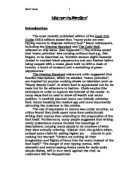Raskolnikov: A Dual or Split Personality.
Definition of Crime and Punishment in the Definitions.net dictionary. Meaning of Crime and Punishment. What does Crime and Punishment mean? Information and translations of Crime and Punishment in the most comprehensive dictionary definitions resource on the web.
Critical Essays Raskolnikov: A Dual or Split Personality However, it is not until this novel that he exposes the reader to a full study of the split personality. Raskolnikov's dual personality is the controlling idea behind the murder and behind his punishment.

Fyodor Dosteoevsky’s Crime and Punishment is a renowned 19th-century novel that has captivated audiences for generations. Part of the appeal for this classic text comes from the densely interwoven and constantly evolving thematic motifs and symbols.

In the novel Crime and Punishment, the author Fyodor Dostoevsky creates a character in Raskolnikov who is plagued with dueling personalities. One side of Raskolnikov is caring and sensitive, often sharing what little money he has with others, while the other side is dark and indifferent, eventually leading him to commit the murders of a pawnbroker and her sister.

The first part of Crime and Punishment published in the January and February issues of The Russian Messenger met with public success. In his memoirs, the conservative belletrist Nikolay Strakhov recalled that in Russia Crime and Punishment was the literary sensation of 1866.

Dostoevsky’s Crime Punishment: Raskolnikov vs. Svidrigailov Dostoevsky’s Crime Punishment is and unique in literature as a book whose true villain is a theory in the mind of its protagonist. This theory of the ubermensch, or superman, is originated by the main character, Raskolnikov, who claims that any breach of the moral.

Religious attitudes to crime and punishment vary, including towards capital punishment. Christianity teaches that sin is a part of human nature and that all people have the potential to commit crimes.

Join Now Log in Home Literature Essays Crime and Punishment Raskolnikov’s Dichotomy Crime and Punishment Raskolnikov’s Dichotomy Anonymous. Fyodor Dostoyevsky, in his work Crime and Punishment, makes it clear from the beginning that Raskolnikov, his somewhat unconventional protagonist, is in a “disturbed state of mind” (Dostoyevsky, 13.

Crime And Punishment Essay Crime and Punishment: Does Punishment work suggest that punishment plays an important role in molding and shaping the behavior of individuals. This includes children, pupils, employees in the workplace, and regular people in our society.

Dichotomy. Dostoevsky purposefully names the main character of his novel Crime and Punishment Raskolnikov. The root of Raskolnikov's family name comes from the Russian word for schism.This is a.

Crime and punishment protagonist and antagonist. Crime and Punishment: Protagonist and Antagonist Essay. Crime and Punishment is considered by many to be the first of Fyodor. Dostoevsky's great books. Crime and Punishment is a psychological account of a. crime. The crime is double murder. A book about such a broad subject can be.

Research Question: How and why does Fyodor Dostoyevsky in Crime and Punishment use symbolism and imagery to characterize the journey of Raskolnikov? Title: “A journey from the perversion of the soul to the return of humanitarian morals and concepts.” “From the perversion of the soul to the return of humanitarian morals and concepts.”.

Crime And Punishment Essay Topics. Look for the List of 123 Crime And Punishment Essay Topics at topicsmill.com - 2020.



